- Opinion
- 29 Nov 23
Roisin El Cherif on Gaza: "There’s something different about this time – the cruelty and the brutality of it"

Following catastrophic violence in Gaza – which has resulted in the deaths of over 15,000 Palestinians since October 7 – Irish-Palestinian singer-songwriter Roisin El Cherif reflects on her own family’s story of displacement, as well as the ongoing humanitarian crisis in Gaza: “What’s keeping me going is believing that humanity will prevail…”
My grandmother was from a village in the Gaza district called Barbara, which doesn’t exist anymore. Today it’s a field, which belongs to the Israeli military.
My grandmother was born in that village, and lived in that village. It was during her time that it was stripped from them.
They lived in refugee camps in Gaza for a bit when the initial fighting broke out, around 1948. With the second influx of fighting, it got too much, and my immediate family – including my grandmother, aunts and uncles – went to Jordan, around ‘67.
They decided they’d go to Jordan to get a reprieve from the fighting, but they always thought they’d go back. It was about running to safety, and staying safe – and then returning.
But as soon as they left Gaza in the ‘60s, there was no right to return. So a lot of the refugees in Jordan, including my family, and other refugees in Lebanon and Syria, can’t go back if they want to. And they all want to. They’re just not allowed.
PERCEIVED DIFFERENTLY
Growing up, there was Palestinian culture all around us – we had hummus for breakfast!
We’d go to Jordan to visit my grandparents, and play with all the kids – because all my aunts and uncles had huge families, as is the custom. They’re a very family-oriented people – they love food and babies! So going to Jordan was great craic for me and my brother. There were so many kids our ages, and we were just allowed to go off and be wild.
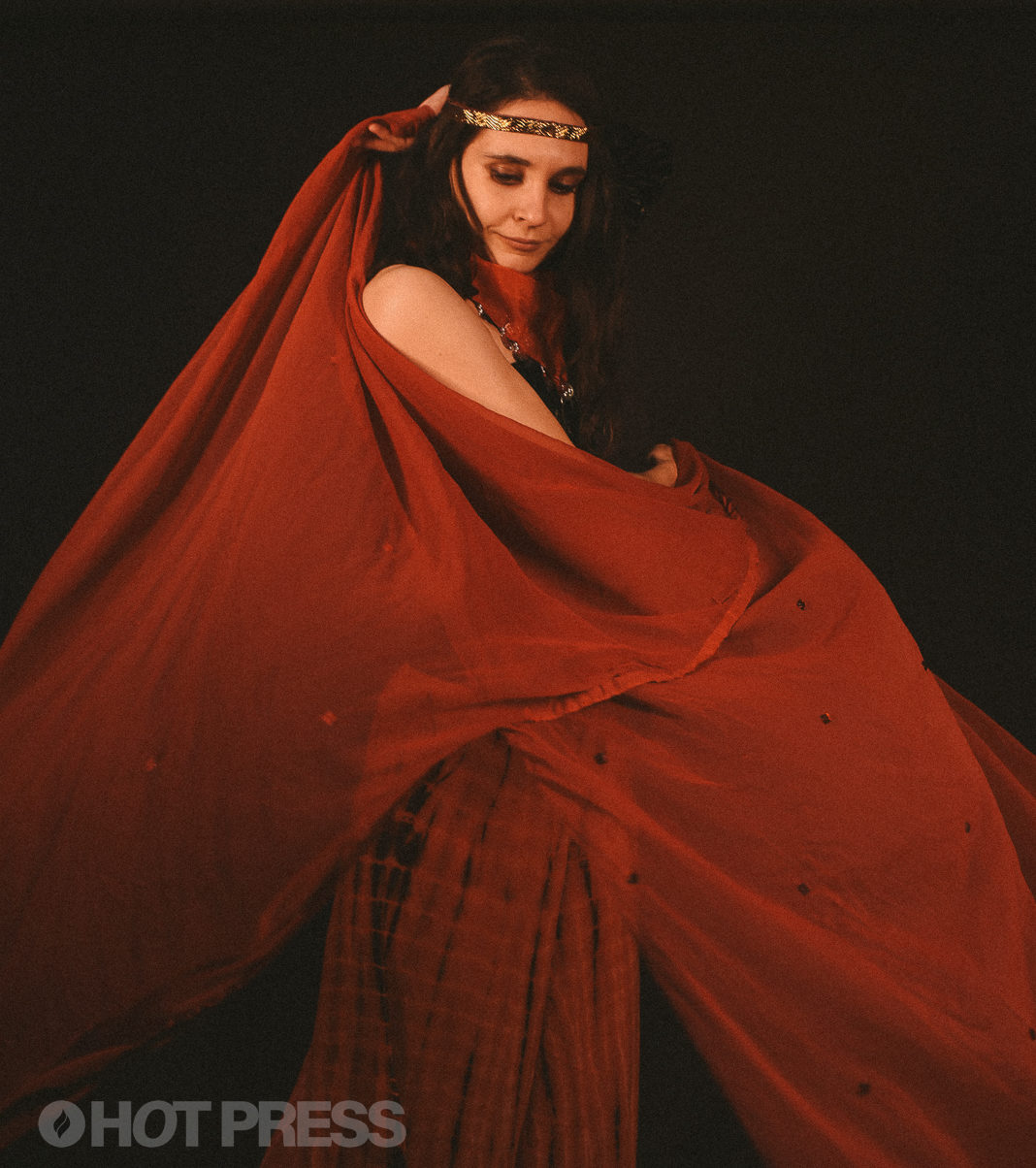
Roisin El Cherif. Copyright Miguel Ruiz.
But the first time I really figured out there was something seriously wrong with where I come from was when I was around nine. I couldn’t sleep, so I went into my mother, who was in the sitting room watching the news.
On the TV there was an Arabic woman who looked very much like my grandmother, screaming her head off – and soldiers, bulldozing her house. My mother was engrossed watching this. I was like, ‘That looks terrible. What is this? Where is this?’
And she said, ‘This is Palestine. This is where your dad is from.’ Watching the story, I realised that the woman whose house was getting demolished was the mother of someone who had been arrested. It was collective punishment.
I knew I was Palestinian, but I didn’t really put two and two together – like why we go to Jordan, and not to Palestine. I didn’t put any of those connections together until much later.
From that moment with my mother and the news, different wars started to affect my life. September 11 happened, and I went from being a really liked person in school, to suddenly being treated with suspicion, because my dad was Arabic and Muslim. He was the only Arabic Muslim where we were living at the time. Kids only repeat what they hear at home, so whatever the people in my class were hearing at home led to: ‘Is Roisin’s dad with the 9/11 terrorists?’
It was from people’s attitudes, and wars around the world, that started to make me realise, ‘Okay, I’m definitely perceived differently.’ Which was strange to me, because the day before, I wasn’t.
Then, in my teens, I started to do research, and connect the dots. I started to take interest in the academic side of what was going on, and how we got here. Norman Finkelstein, Ilan Pappé, Avi Shlaim and Gideon Levy are all academics making the rounds now who’ve been talking about Palestine and Israel for many years. I was learning about Jordan and Lebanon, and all the fights and revolts and absolute massacres that happened in all these Arabic countries that neighbour Palestine. It started to click then: ‘Oh, my family are refugees.’
An interesting thing about Palestinian people is that they very rarely call themselves refugees. They don’t actually think they’re refugees, because they always think they’re going to go back. They think this is temporary, this displacement and dispossession, and living in refugee camps – which get worse and worse, and more overcrowded, every year. The hope that these people have, which I’m in awe of, is based on the fact that they have a land. It’s just over there – they can see it.
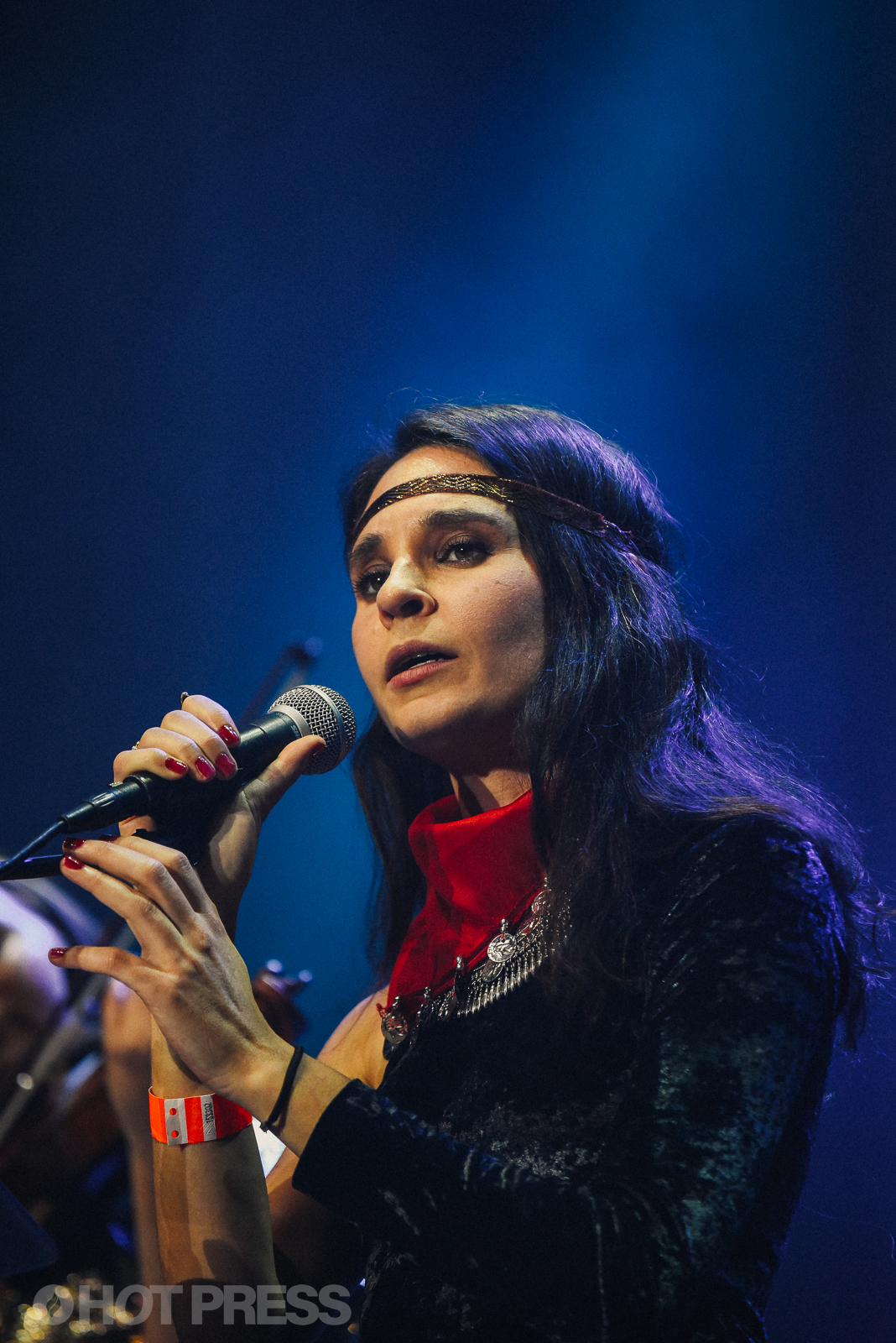
Roisin El Cherif at the Gaza Gig at 3Arena. 28th of November 2023. Copyright Miguel Ruiz.
THE TOLL OF LOSS
I’ve never set foot in Palestine. And that’s because a lot of my immediate family, who have stronger ties to it, can’t do it. People say I could, with my Western passport. And I would love to see who I’m related to over there. But the truth is, it’s never been an option for me to just go and ‘have a look.’ It’s not like a tourist destination for me. It would be a very painful trip.
I still have family members in Gaza. My dad’s in contact with people close to him, who he hasn’t been able to see in many years, in Gaza, so I get all my information from him. The last time I asked, there were 18 people from the El Cherif clan that are gone. I saw the photos and the names of the 18 people from our family who are no longer with us, from second cousins, to third cousins, to uncles.
Families in the Arabic world are the tribes – because there’s usually a lot of members. I commiserated with my dad over the 18 members, and he said to me: ‘Some people have lost more. Some people have lost 45, or 60.’
Palestinians refuse to hold onto their suffering. Even the Palestinians who live in the diaspora, who have an inherited trauma – they almost don’t feel like they have the right, or the space, to actually grieve all the things that they have lost. Because the toll of loss is so high.
The reason they push it down is because the loss is more than losing where you live, or your house, or your field. You’ve lost your window to the past, which also makes you who you are in the present. I don’t think a lot of them, including myself, know how to deal with grief and loss when it’s still ongoing. We can’t even feel sad about the village that was lost in my grandparents’ time, because there’s more bloodshed happening today, in the same name of that war.
I would love to say that healing can happen soon. But the fighting has to stop before any healing can begin. There’s so much to unpack that hasn’t been allowed to be unpacked, for decades.
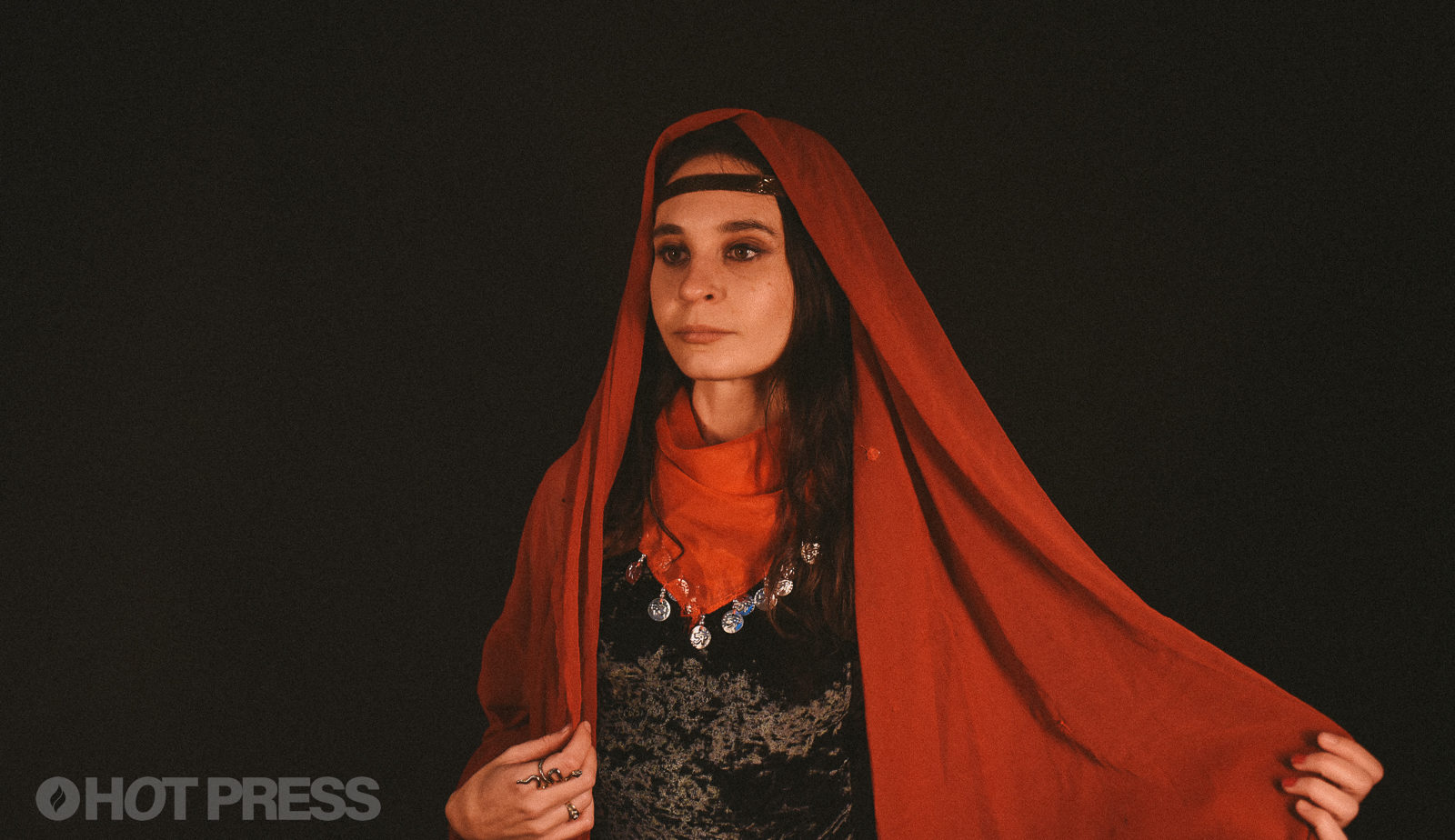 Roisin El Cherif. Copyright Miguel Ruiz.
Roisin El Cherif. Copyright Miguel Ruiz.RUN OUT OF FEELINGS
What we have to realise about this whole war, of Israelis against Palestinians, is that it’s also psychological warfare.
People are reading now, and their minds are exploding, based on all the information that has been kept from them. Even ten years ago, there were so many things you couldn’t really talk about. You couldn’t talk about the elephant in the room, in case you offended someone – which is part of the problem of why this has gone on for so long. Somewhere along the line, in Western media and Western opinion, being Palestinian became offensive. Or even worse.
It’s not a religious fight – we Palestinans have Jewish blood in us, Christian blood in us, and Muslim blood in us. For Palestinians, it’s about being a native people who belong to the land, who have always been on the land – and who are now being occupied. So from that point of view, it’s not complicated. What is complicated is everybody and their mother’s agenda with the land in the Middle East. There are so many layers to that.
But I don’t even have words for how stunned I am everyday, by the next worst thing I’m going to see. I’ve run out of words, and I’ve run out of feelings.
I’m also seeing what’s basically Israeli propaganda, saying that they’re peacefully evacuating Gazans from the fighting. They're not evacuating – they’re evicting them. It’s ethnic cleansing.
Their hatred, unfortunately, is so extreme, and their indoctrination is so extreme. It’s not sustainable, because at the end of the day, people are human, and whatever they’re doing now – that they might fully believe is right and correct – will haunt them. That’s what happens, like we've seen with the American veterans who went to Vietnam, or to Iraq, who now have PTSD. There’s no way you can do this, and think it won’t fracture your human soul.
CRUELTY AND BRUTALITY
This isn’t the first time that we’ve been watching Gaza blown up to bits. But there’s something different about this time – the cruelty and the brutality of it.
Something in me this time has died, or has changed forever. Because everything is a lie. The media outlets who I thought we could trust, we can’t trust. My old life, of hoping for the best, and believing in humanity, is totally shook. I can’t understand how there’s people trying to justify this loss of life. It’s crushing to know 4that’s what we’re up against.
So life has lost all meaning – and the only way to get meaning again is to free Palestine.
The fact of the matter is that my grandparents were born in Palestine, and died in Jordan. No one is going to compensate my family, or the other families all over the Arabic world, and the rest of the world, who are refugees living in camps. We can never undo everything that’s gone on.
But what’s keeping me going is believing that humanity will prevail – as I believed all along, even though this has been absolutely soul-crushing. And that we will fight systems of oppression, wherever they are.
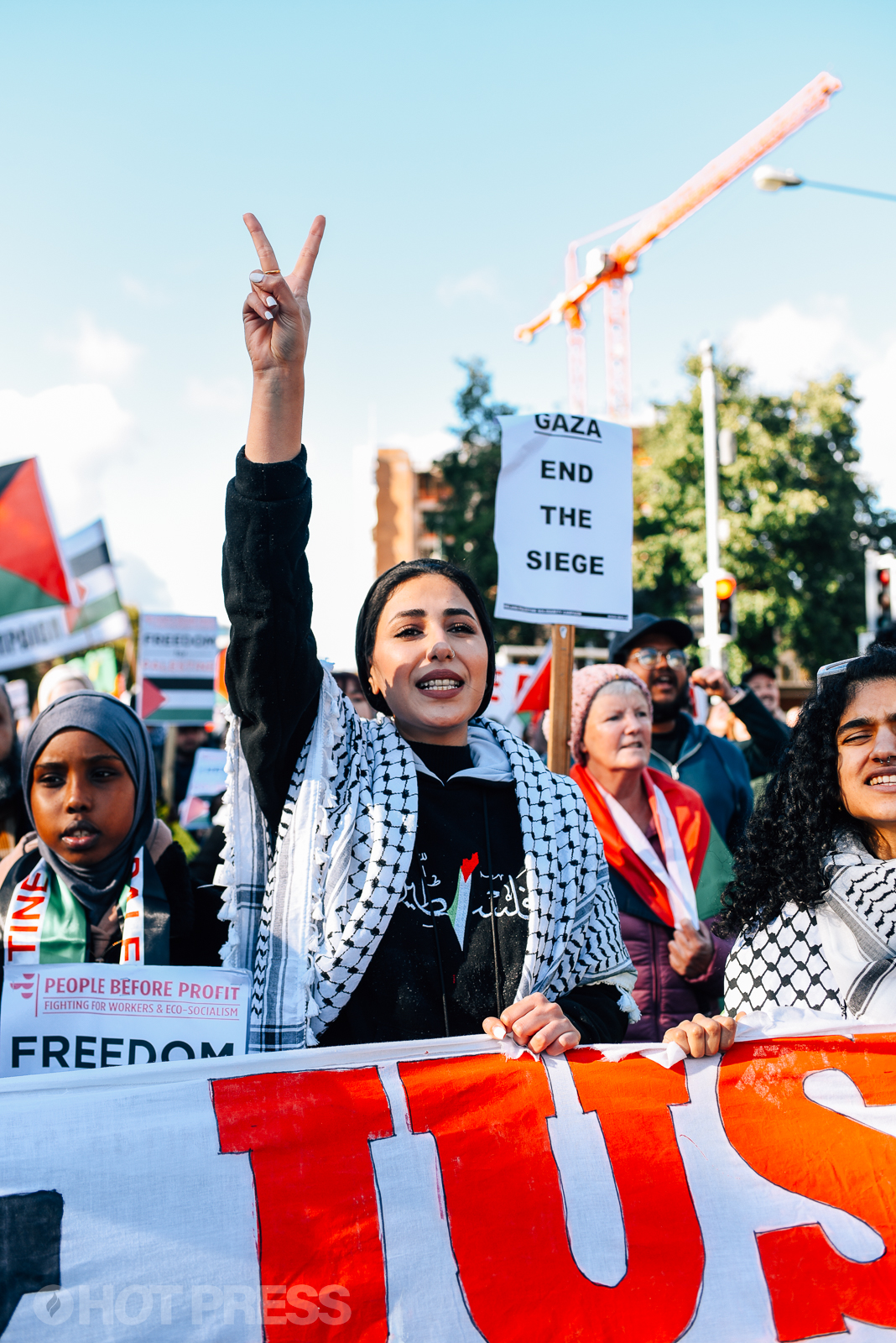
Pro-Palestine protest in Dublin. Saturday 14th of October 2023. Copyright Miguel Ruiz.
The only way to keep on going is to be absolutely outraged. It’s not normal to watch this. None of this is normal, and none of this should be accepted.
So I cling onto the hope that this will bring a great change. I’m banking on people, and their humanity, to rise up to the powers that be. Because it doesn’t have to be the way it is.
I’m in so much awe of all the Irish people who are getting together – from artists and musicians, to writers and fundraisers. They all want to do what’s right, which is to basically end apartheid, and end occupation. I think Irish people, and Ireland, should lead the way.
There’s always been Palestinian solidarity in Ireland. My family lived around the globe, and in some of the other Western countries that we lived in, I would say I’m Palestinian, and it would be met with an awkward silence, or a look. Or, ‘Did you mean Pakistan?’ Or, ‘Are you sure that’s not Israel?’ Or, ‘Are they all those terrorists doing suicide bombings?’
But when we moved to Ireland, I didn’t have to deal with any of that, and I didn’t feel that there was anything wrong with being Palestinian.
It’s not a new thing, Irish people taking an interest in Palestine. Irish people were the colonised, not the colonisers, and there’s a huge, strong history to that.
Ireland absolutely should be expelling the Israel ambassador. It’s not personal – it’s because that’s how you send a message to a country that is not playing by the rules. South Africa didn’t play by the rules, and it was sanctioned and boycotted. We should be applying that now.
I’m doing these Irish Artists for Palestine gigs, and I’m delighted to be singing these Arabic songs that mean so much to me. We need to channel our grief into these amazing performances and protests – and demand action.
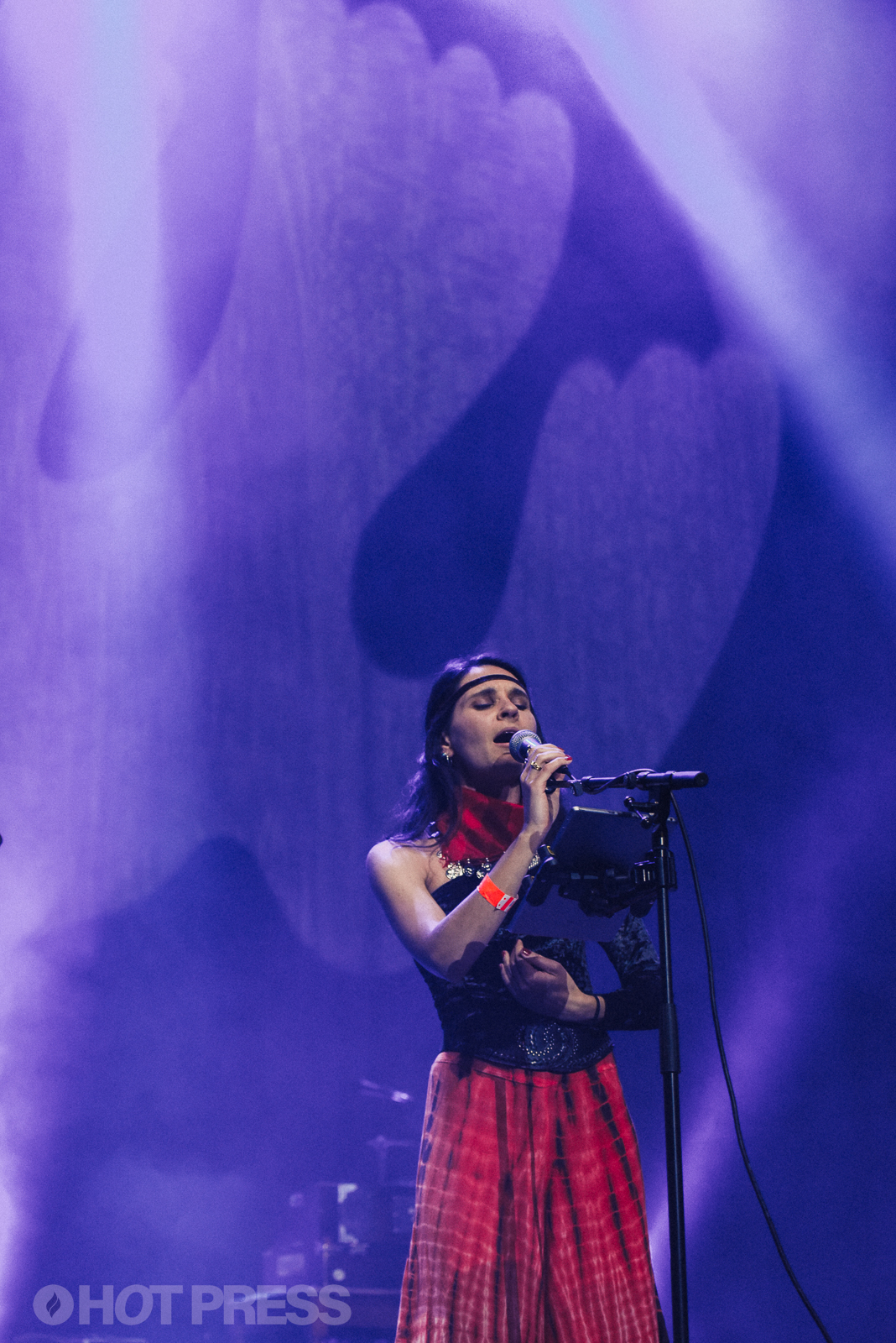
Roisin El Cherif by Miguel Ruiz
Roisin El Cherif played two Irish Artists For Palestine gigs at 3Olympia Theatre and the 3Arena in Dublin last night. She's also set to perform at the IAFP shows at Dolan’s Upstairs, Limerick (tonight, November 29) and St Comgall's, Belfast (Friday, December 1).
RELATED

- Opinion
- 31 Dec 25
Climate crisis: "The battle must go on. The alternative is unthinkable"

- Opinion
- 24 Dec 25
Migration: It's Time To Stop Blaming The Victims
RELATED

- Opinion
- 17 Dec 25
The Year in Culture: That's Entertainment (And Politics)

- Opinion
- 16 Dec 25






